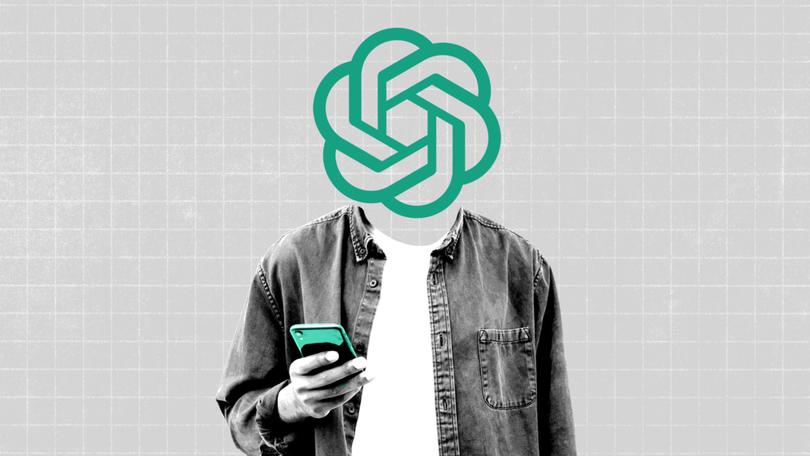PARMY OLSON: How to develop a healthy relationship with AI tools like ChatGPT
PARMY OLSON: Tech companies should explore ways of designing products that help rather than hinder mental development — and it’s time to have a broader conversation about creating healthy boundaries with AI.

Edison Earl excels at his job as a graduate intern at Arts University Bournemouth in England. He’s produced more marketing content than ever for the school and doubled its Instagram followers in the past seven months. But he struggles to take credit, since the ChatGPT app did much of the work. In the last two years he’s gone from brainstorming on paper to talking to ChatGPT most of the day. “Can you rewrite this email for me?” he’ll ask it. “What do you think of this social media post and this event?” And it not just work; the 23-year-old enlists its help in everything from choosing what to eat to what clothes to buy.
Earl freely admits that he’s become dependent on the tool launched by OpenAI in late 2022, now regularly used by more than 400 million people. It and similar software, including Gemini from Alphabet Inc’s Google or Anthropic’s Claude, are marketed as digital interns or research assistants. The downside for actual interns and new starters I’ve spoken to: Some are becoming overly reliant on artificial intelligence, muddying the path to seniority, undermining their self-confidence and heightening their imposter syndrome. “I was trusting it so much that I lost faith in my own decisions and thought process,” Earl says.
Young employees use AI tools more than middle and senior managers, often because they’re still developing an “internal compass,” according to a 2025 study by Dutch management consultancy BearingPoint, which surveyed more than 300 managers in Europe and the US. While senior execs often ignore AI tools because they trust their own expertise (a little too much, perhaps), their newest recruits do the opposite.
Sign up to The Nightly's newsletters.
Get the first look at the digital newspaper, curated daily stories and breaking headlines delivered to your inbox.
By continuing you agree to our Terms and Privacy Policy.Earl recalls having immense pride in his work before he started using ChatGPT. Now there’s an emptiness he can’t put his finger on. “I became lazier… I instantly go to AI because it’s embedded in me that it will create a better response,” he says. That kind of conditioning can be powerful at a younger age. An HR executive shared this week that one of her new recruits confessed to not knowing how to contribute to team meetings. When pressed as to why, she explained that she’d entered the workforce during the COVID lockdowns, and had come to rely on the hand-raising feature on Microsoft Teams, the video conferencing platform. With no hand emoji to activate in real life, she had to learn how speak up in work confabs.
AI’s conditioning goes beyond office etiquette to potentially eroding critical thinking skills, a phenomenon that researchers from Microsoft have pointed to and which Earl himself has noticed. “It does feel like my brain is a bit idle,” he says. “I’m not pushing the boundaries of my brain as much, pushing my own thoughts.”
Of course, nothing is black and white, and ChatGPT offers plenty of benefits. Having used it to help track his spending at the pub and elsewhere, Earl has managed to balance his budgets for the first time. He’s pointed his phone camera at store shelves to help pick out clothes and become more confident in his outfits as a result. But he misses the exploration of shopping and getting things wrong. “That spark where I walk into a store and see something and think, ‘That resonates with me,’ I’m not having that anymore,” he says. “I’m buying things because ChatGPT told me to.”
This might seem like an extreme case, but there’s growing evidence that many people, particularly those who skew younger and have leaned on AI tools for things like homework, are developing dependencies on the technology for both work and personal matters. One recent study puts that down to the beguiling way chatbots can do tasks in an instant, and the fact their responses are so friendly.
The latter is probably more powerful than we realize. Think of the dopamine hit you get when you hear a compliment, and consider that ChatGPT and its competitors often frame their answers with flattery and positive encouragement. OpenAI co-founder Sam Altman recently admitted that his latest version of the tool had become too “sycophant-y,” and that his engineers were working to rein it back.
OpenAI’s own research revealed last month that while most ChatGPT users have a healthy relationship with the tech, a subset of power users show signs of “emotional dependence.” The randomized control trial of 981 participants suggested these people exhibited “problematic usage.”
Altman faces maintaining a delicate balance between keeping people on ChatGPT — paying subscriptions or potentially looking at ads — and creating another reason to be hooked to our tiny screens.
Realizing he’d probably developed a habit, Earl last week cancelled his $41 subscription to ChatGPT. After two days, he already felt like he was achieving more at work and, oddly, being more productive. “It feels like I’m working again,” he says. “I’m planning and thinking and writing.” But total abstention from AI probably isn’t the answer either, especially when others are using it to gain a competitive edge. The challenge now is for Earl and other young professionals to use it without letting their brains atrophy.
“Critical thinking is a muscle,” says Cheryl Einhorn, founder of the consultancy Decision Services and an adjunct professor at Cornell University. To avoid outsourcing too much to a chatbot, she offers two tips: “Try to think through a decision yourself and ‘strength test’ it with AI,” she says. The other is to interrogate a chatbot’s answers. “You can ask it, ‘Where is this recommendation coming from?’” AI can have biases just as much as humans, she adds.
Earl’s search for a healthy balance of AI may be one of the big challenges of his generation. But technology companies also should explore ways of designing products that help rather than hinder mental development. And a broader conversation about creating healthy boundaries with AI wouldn’t go amiss either. Earl’s candor in that regard is refreshing. We need more of it.
This column reflects the personal views of the author and does not necessarily reflect the opinion of the editorial board or Bloomberg LP and its owners.
Parmy Olson is a Bloomberg Opinion columnist covering technology. A former reporter for the Wall Street Journal and Forbes, she is author of “Supremacy: AI, ChatGPT and the Race That Will Change the World.”
